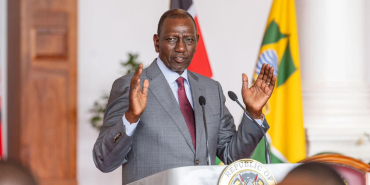Nairobi’s Leadership Curse: Kidero’s Failures, Sonko’s Downfall, Sakaja’s Crisis

Nairobi Governor Johnson Sakaja is facing mounting political pressure amid growing concerns over financial mismanagement, rising county debt, and deteriorating public services.
Twelve years after the introduction of Kenya’s devolved system of government, the office of the Nairobi governor remains one of the most powerful yet unstable positions in the country. Successive holders of the post have encountered persistent challenges, including allegations of corruption, internal power struggles, and repeated clashes with political and bureaucratic interests.
When Dr Evans Kidero took office in 2013 as Nairobi’s first governor under the new constitution, expectations were high. A former corporate executive, Kidero was seen as a technocrat capable of driving urban reform. However, his administration soon faced widespread criticism over inefficiency and corruption. He struggled to dismantle entrenched cartels operating in areas such as waste management, land transactions, and revenue collection.
Kidero eventually lost his re-election bid in 2017 and was later arrested on charges including abuse of office and money laundering. Mike Sonko, who succeeded Kidero, brought a populist style to City Hall. Known for his flamboyant public image and strong grassroots support, Sonko initially attracted widespread attention. But his administration was soon marked by erratic governance, confrontations with officials, and failure to appoint a deputy governor after Polycarp Igathe resigned, citing an inability to work with him.
In 2020, Sonko controversially handed over key county functions to the national government, leading to the formation of the Nairobi Metropolitan Services (NMS) under Major-General Mohamed Badi. Later that year, Sonko was impeached by the Nairobi County Assembly and removed from office by the Senate for gross misconduct.
Ann Kananu briefly served as acting governor but played a limited role during her time in office. In 2022, Johnson Sakaja was elected on a platform of restoring order, improving service delivery, and tackling the longstanding influence of cartels. His campaign focused on infrastructure, revenue collection reforms, and transparent governance.
Less than three years into his term, Sakaja is under growing scrutiny. Reports of delayed staff salaries, questionable procurement procedures, and rising public dissatisfaction have raised concerns about the county’s financial management. The Nairobi County Assembly has issued warnings of possible impeachment, citing poor consultation and governance failures. Some assembly members have accused Sakaja of creating a power network within City Hall, contradicting his earlier pledges to dismantle such systems.
National political leaders, including President William Ruto and opposition leader Raila Odinga, have stepped in to reduce tensions, but the threat of political fallout remains. While Sakaja has promised to improve cooperation with the assembly, he has also claimed that political actors are working to undermine his administration.
Analysts warn that the recurring problems in Nairobi’s leadership may reflect deeper structural flaws.
Governance expert Joyce Kimani notes a pattern in which each governor begins with reform promises but is eventually overwhelmed by internal resistance and political infighting. Dr Isaac Gichuki, a political analyst based in the United States, describes the office as a “cautionary tale,” arguing that weak oversight and systemic corruption continue to limit meaningful change.














Comments
All the three failed…
Permalink
All the three failed governors of Nairobi are Ruto’s/Raila’s corruption best buddies! Kidero, Sonko and Sakaja have enriched themselves with stolen tax payers money! The only solution to this menace is by removing devolution which has created a blotted unnecessary expenditure and return back to 8 provinces run by a provincial commissioner. Devolution is nothing short of a corruption machinery now benefiting the 47 county governors who are busy siphoning county allocated tax payers money and hiding it in foreign banks.
Add new comment